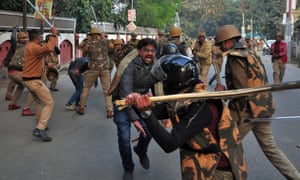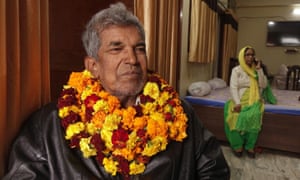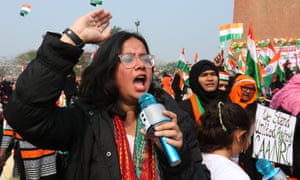Uttar Pradesh’s leading protesters against new citizenship law believe they were rounded up to quell further dissent
The Observer
India
Hannah Ellis-Petersen in Delhi and Shaikh Azizur Rahman in Lucknow
Sat 1 Feb 2020

Police officers confront protesters in Lucknow on 19 December. Photograph: STRINGER/Reuters
At 73 years old, Mohammad Shoaib had grown used to harassment from police. As one of India’s highest-profile activists, he had made a name fighting for Muslims falsely accused of being terrorists by the police, earning him powerful enemies.
But in late December, as he was brought into the police station in Lucknow, in the northern state of Uttar Pradesh, in the middle of the night, he felt something had shifted. “Police officers abused me badly while I was in their custody and they threatened me in many ways,” he said. “One [senior officer] said to me at the police station: ‘I will fuck your mother. I am going to throw all your family members in jail where they will rot for life. I will destroy your family’.”
As India erupted in protest over a controversial new citizenship bill late last year, Shoaib was among dozens of leading social and legal activists who began to be systematically and illegally targeted, rounded up and detained by police, with several tortured and most kept in prison on fabricated charges, without ever being presented to a magistrate, as the law requires.
While the BJP government is notoriously intolerant of critics, the systematic crackdown on some of the most recognisable civil society activists has been unprecedented in both scale and fervour. It has also been concentrated in Uttar Pradesh, where the BJP government led by chief minister Yogi Adityanath, known for his anti-Muslim and staunchly Hindu nationalist rhetoric, vowed “revenge” on those who had taken to the streets to protest at the controversial Citizenship Amendment Act (CAA). Police have been accused of firing on protesters, rounding up hundreds of innocent Muslims in the state and torturing men, women and children in custody.
In seven cases recounted to the Observer, activists alleged they had been detained on entirely falsified charges by police. For Shoaib, his detention was particularly farcical. He stands accused of leading a protest that turned violent in Lucknow on 19 December, despite the fact it occurred while he was under police house arrest, having been detained the night before. “Police kept my house under watch and restrained me from going out. How could I possibly be present at the protest site, away from my home that afternoon?” he said. “Yet, the police charged me with attempted murder, arson and rioting. For years many police officers have viewed me as their enemy and now they are portraying me as a conspirator and violent rioter, without any basis.”
At 73 years old, Mohammad Shoaib had grown used to harassment from police. As one of India’s highest-profile activists, he had made a name fighting for Muslims falsely accused of being terrorists by the police, earning him powerful enemies.
But in late December, as he was brought into the police station in Lucknow, in the northern state of Uttar Pradesh, in the middle of the night, he felt something had shifted. “Police officers abused me badly while I was in their custody and they threatened me in many ways,” he said. “One [senior officer] said to me at the police station: ‘I will fuck your mother. I am going to throw all your family members in jail where they will rot for life. I will destroy your family’.”
As India erupted in protest over a controversial new citizenship bill late last year, Shoaib was among dozens of leading social and legal activists who began to be systematically and illegally targeted, rounded up and detained by police, with several tortured and most kept in prison on fabricated charges, without ever being presented to a magistrate, as the law requires.
While the BJP government is notoriously intolerant of critics, the systematic crackdown on some of the most recognisable civil society activists has been unprecedented in both scale and fervour. It has also been concentrated in Uttar Pradesh, where the BJP government led by chief minister Yogi Adityanath, known for his anti-Muslim and staunchly Hindu nationalist rhetoric, vowed “revenge” on those who had taken to the streets to protest at the controversial Citizenship Amendment Act (CAA). Police have been accused of firing on protesters, rounding up hundreds of innocent Muslims in the state and torturing men, women and children in custody.
In seven cases recounted to the Observer, activists alleged they had been detained on entirely falsified charges by police. For Shoaib, his detention was particularly farcical. He stands accused of leading a protest that turned violent in Lucknow on 19 December, despite the fact it occurred while he was under police house arrest, having been detained the night before. “Police kept my house under watch and restrained me from going out. How could I possibly be present at the protest site, away from my home that afternoon?” he said. “Yet, the police charged me with attempted murder, arson and rioting. For years many police officers have viewed me as their enemy and now they are portraying me as a conspirator and violent rioter, without any basis.”

FacebookTwitterPinterest Mohammad Shoaib, 73, was accused of leading the Lucknow protest while he was under house arrest Photograph: Shaikh Azizur Rahman
After police failed to produce any evidence before a judge, Shoaib was bailed last month, following weeks behind bars. But the charges have not been dropped. “Activists are facing an increased level of pressure or crackdown,” he said of the past three months. “The government is trying to silence all types of dissent and shrink the space for activism. It is trying to break the backbone of activism in the state.” Sadaf Jafar, another prominent activist in Uttar Pradesh and spokesperson for the Congress political party, wept as she recounted the torture she says she endured when arrested on 19 December.
She says she was arrested while protesting peacefully at the Lucknow rally against the new citizenship law, and was among those later facing 20 charges, including inciting violence and attempted murder. She was detained until early January, when a judge granted her bail due to lack of evidence. While in the police station, Jafar said, officers subjected her to relentless racist and Islamophobic slurs. “They started slapping and beating me, calling me ‘Pakistani’ and other language I could never repeat.
“One of the female officers, who was filled with this anger, shouted: ‘I am going to beat you so hard I draw blood’,” said Jafar. “She pulled my hair and clawed my face and hands. And then another senior male officer told me he had seen me ‘talking big’ at the protest and that he would teach me a lesson; that he would charge me with attempted murder and make sure I ‘rotted in prison’. He pulled me down by my hair, kicked me in my stomach and knees… I have spent my life fighting for people’s rights but I never imagined the police would act in this way.”
It is not just Muslim activists who report torture. Deepak Kabir, 46, a prominent Hindu poet and activist, said he had been arrested and badly beaten after he went into a police station to look for fellow activists. “They are going after activists because we are willing to fight,” he said. “It’s a very thought out process to target well-known faces because if they crush us, then everyone else is immediately intimidated.” SR Darapuri, 76, a former senior police officer turned activist, who has long irritated authorities in Uttar Pradesh with his outspoken comments about extrajudicial killings by police, alleged the police had gone to “extreme lengths” to arrest and then charge him with rioting, attempted murder and criminal conspiracy related to Lucknow protests that turned violent. “For 46 hours they kept me without food,” he said. “I am a retired senior police officer from the rank as high as inspector general and I was forced to endure such torture.” Darapuri described how, after his arrest at home on 20 December, police brought him before a magistrate, as is legally required before he could be sent to jail. But the magistrate refused to grant permission, citing lack of evidence, and criticised the officers for Darapuri’s “wrongful arrest”. But that did not stop them. “After taking me back to Hazratganj police station, the police officer recorded a report in which he stated that I had been taken to a magistrate but he was not available,” he said. “This was not the truth. The magistrate refused to remand me in custody because he believed I was innocent.
”
\Activist Sadaf Jafar says she was kicked in the stomach and knee by a senior police officer and told she would ‘rot in prison’. Photograph: Shaikh Azizur Rahman
The same day, Darapuri was taken to jail where he was kept until 5 December, when he was bailed. At the hearing the Uttar Pradesh police failed to produce any evidence against him, claiming video footage of his alleged offences was “too hazy or grainy and none of the people there could be identified”.
The Uttar Pradesh police and government have denied any wrongful and illegal arrests and torture in custody. Uttar Pradesh BJP spokesperson Rakesh Tripathi said: “Bail doesn’t mean that Sadaf and Darapuri have been given a clean chit. They will have to face trial in court. The statements made by them after release are objectionable, baseless and provocative.”
Yet the arrests of activists have continued. Last Wednesday, hours before he was due to address an anti-CAA rally in Mumbai, activist Dr Kafeel Khan was arrested by Uttar Pradesh Police Special Task Force for allegedly delivering a “provocative” speech in Aligarh, Uttar Pradesh, at a rally on 12 December. On Friday, police filed new complaints against Shoaib, Kabir and several other activists after they staged a peaceful candlelit vigil against the act.
Sandeep Pandey, another prominent Lucknow-based activist involved in the anti-CAA protests described the escalation in attacks on critics. “My emails and phones have been kept under surveillance by the government,” he said. “We have been jailed before for activism-related activities but we used to get bail and come out of jail. Police didn’t misbehave with us. Now, in recent months, police have changed their attitude towards us and we are being badly abused by them… The rights activists are facing the worst crackdown in Uttar Pradesh; in no other state in India is the situation is as bad,” he said. “This is out and out a fascist regime.”
The passing of the citizenship amendment act in December has led to India’s greatest unrest for more than four decades. The law says all Hindu, Christian, Jain, Buddhist and Sikh migrants who arrived from Bangladesh, Pakistan and Afghanistan before 2014 can claim citizenship. But the same does not apply to Muslim migrants. Many believe the act brazenly discriminates against Muslims and could tear apart the secular foundations of India. There are also fears that associated plans for a national register of citizens will require only Muslims to produce evidence of their nationality, and could lead to detentions and deportation. Over the past month, millions have taken to the streets every week in the first backlash against Narendra Modi and his Hindu nationalist BJP government, and the response has increasingly been one of force, with public gatherings banned and peaceful student protesters met with violence and openly communal and anti-Muslim rhetoric used in the BJP campaign for the Delhi state elections which will be held next weekend.

\Activist Sadaf Jafar says she was kicked in the stomach and knee by a senior police officer and told she would ‘rot in prison’. Photograph: Shaikh Azizur Rahman
The same day, Darapuri was taken to jail where he was kept until 5 December, when he was bailed. At the hearing the Uttar Pradesh police failed to produce any evidence against him, claiming video footage of his alleged offences was “too hazy or grainy and none of the people there could be identified”.
The Uttar Pradesh police and government have denied any wrongful and illegal arrests and torture in custody. Uttar Pradesh BJP spokesperson Rakesh Tripathi said: “Bail doesn’t mean that Sadaf and Darapuri have been given a clean chit. They will have to face trial in court. The statements made by them after release are objectionable, baseless and provocative.”
Yet the arrests of activists have continued. Last Wednesday, hours before he was due to address an anti-CAA rally in Mumbai, activist Dr Kafeel Khan was arrested by Uttar Pradesh Police Special Task Force for allegedly delivering a “provocative” speech in Aligarh, Uttar Pradesh, at a rally on 12 December. On Friday, police filed new complaints against Shoaib, Kabir and several other activists after they staged a peaceful candlelit vigil against the act.
Sandeep Pandey, another prominent Lucknow-based activist involved in the anti-CAA protests described the escalation in attacks on critics. “My emails and phones have been kept under surveillance by the government,” he said. “We have been jailed before for activism-related activities but we used to get bail and come out of jail. Police didn’t misbehave with us. Now, in recent months, police have changed their attitude towards us and we are being badly abused by them… The rights activists are facing the worst crackdown in Uttar Pradesh; in no other state in India is the situation is as bad,” he said. “This is out and out a fascist regime.”
The passing of the citizenship amendment act in December has led to India’s greatest unrest for more than four decades. The law says all Hindu, Christian, Jain, Buddhist and Sikh migrants who arrived from Bangladesh, Pakistan and Afghanistan before 2014 can claim citizenship. But the same does not apply to Muslim migrants. Many believe the act brazenly discriminates against Muslims and could tear apart the secular foundations of India. There are also fears that associated plans for a national register of citizens will require only Muslims to produce evidence of their nationality, and could lead to detentions and deportation. Over the past month, millions have taken to the streets every week in the first backlash against Narendra Modi and his Hindu nationalist BJP government, and the response has increasingly been one of force, with public gatherings banned and peaceful student protesters met with violence and openly communal and anti-Muslim rhetoric used in the BJP campaign for the Delhi state elections which will be held next weekend.
---30---
No comments:
Post a Comment